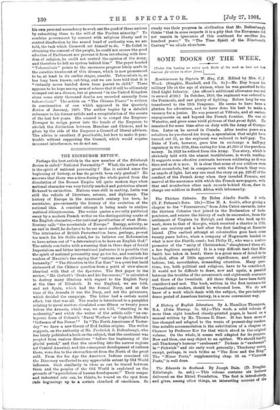THE EDINBURGH REVIEW.
Perhaps the best article in the new number of the Edinburgh Review is called" National Personality." What, the author asks, is the spirit of national personality ? Has it existed since the beginning of history, or has its growth been only gradual ? He answers that there was a time during the whole period from the dissolution of the Roman Empire till quite modern days when national character was very faintly marked and patriotism almost flickered to extinction. Nations were still in making, Latin was still the vehicle of literature, science, and diplomacy. The history of Europe in the nineteenth century has been, he maintains, pre-eminently the history of the evolution of the national idea. A constant attempt is being made to analyse national idiosyncrasies. The writer quotes a recently published essay by a modern French writer on the distinguishing marks of the English character,—the national peculiarities of what Mons. Bontmy calls "the provincials of Europe." Energy, activity, as an end in itself, he declares to be our most marked characteristic. The intricacies of British Protestantism have, perhaps, proved too much for his Gallic mind, for he believes our Reformation to have arisen out of "a determination to have an English God." The article concludes with a warning that in these days of fervid Imperialism and bitter international jealousies it is possible that the spirit of national personality may go too far, and reminds his readers of Mazzini's fine saying that "nations are the citizens of humanity." "The Situation in the Far East" is a quiet but lucid statement of the Chinese question from a point of view almost identical with that of the Spectator. The first paper in the review, "Mr. Corbett'a 'Drake and his Successors," is calculated to destroy many illusions with regard to the English Navy at the time of Elizabeth. It was England, we are told, and not Spain, which had the formal Navy, and at the time of the Armada it was the Navy, and not the privateers, which decided the campaign. The latter had a certain moral effect, but that was all. The reader is introduced to a pamphlet relating to naval matters circulated some fifteen or twenty years before the Armada, which was, we are told, "startling in its modernity," and which the writer of the article calls "an em- bryonic form of Colomb's Naval Warfare' or Captain Mahan's Influence of Sea Power." In "The North Americans of Yester- day" we have a new theory of Red Indian origins. The writer suggests, on the authority of Mr. Frederick S. Dellenbaugh, who has lately published a book on the subject, that the continent was peopled from various directions "before the beginning of the glacial period," and that the crowding into the narrow regions (of Central America). and the consequent development of culture there, were due to the encroachment from the North of the great cold. From the Ice Age the American Indians remained till the Discovery unaffected to any appreciable extent by Old World influence. Such similarity in ideas as can be traced between them and the peoples of the Old World is explained on the grounds of "a parallelism of human development." Their usages and industrial arts can, he thinks, be traced on the spot from rude beginnings up to a certain standard of excellence. So
steady was their progress in civilisation that Mr. Dellenbaugh thinks "that in some respects it is a pity that the Europeans did not remain in ignorance of this continent for another five hundred years." To "The Time Spirit of the Nineteenth Century" we allude elsewhere.


































 Previous page
Previous page